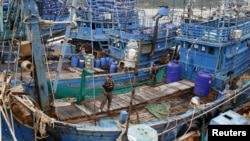Australia has proposed new laws in parliament in a bid to become a world leader in fighting slavery. More than 3,000 Australian companies will be required to report what they are doing to avoid slavery in their supply chains.
The government says the proposed laws are a milestone in Australia’s fight against a “heinous crime.”
It is estimated there are 4,000 people in slavery-like conditions in Australian farms, mines, building sites, brothels and homes.
Many have been trafficked from Asia, particularly South Korea, Malaysia and Thailand.
Modern slavery
Victims of modern slavery can be bullied into prostitution through coercion or threats to family members back home, or forced to work for low wages on construction sites or in factories. Slavery can include also the theft of wages.
Under the legislation, a Modern Slavery Business Engagement Unit will be set up to monitor the new regulations.
Alex Hawke, Australia’s assistant minister for Home Affairs, says the law will make a difference.
“For the first time, large businesses will be required to identify how their operations and supply chains may contribute to modern slavery and explain what they are doing to address these risks,” he said. “This bill will send a clear message that modern slavery is unacceptable in the supply chains of all of our goods and services.”
Law needs teeth
Campaigners believe the Australian legislation is an important step but say there should be penalties for companies that fail to comply or don’t do enough to eradicate slavery.
“A mandatory reporting scheme is not really mandatory if there are no consequences for companies that fail to comply,” said Keren Adams, the director of advocacy at the Human Rights Law Center. “So without financial penalties and with no independent commissioner to help enforce them, we think the new laws will lack the necessary teeth to make sure that the worst offenders lift their game. We think the government needs to urgently address the weaknesses in the bill and send a strong message to brands that profiting from abuse will not be tolerated.”
The anti-slavery law is expected to be approved by Australia’s parliament. If so, it will be reviewed in three years to see how it is working.
The results of a three-year investigation by Australia’s workplace watchdog found foreign workers and backpackers on farms are being treated like “slaves.”
The United Nations has estimated that 25 million people are exploited in international supply chains, including in the agriculture, construction and manufacturing industries.




